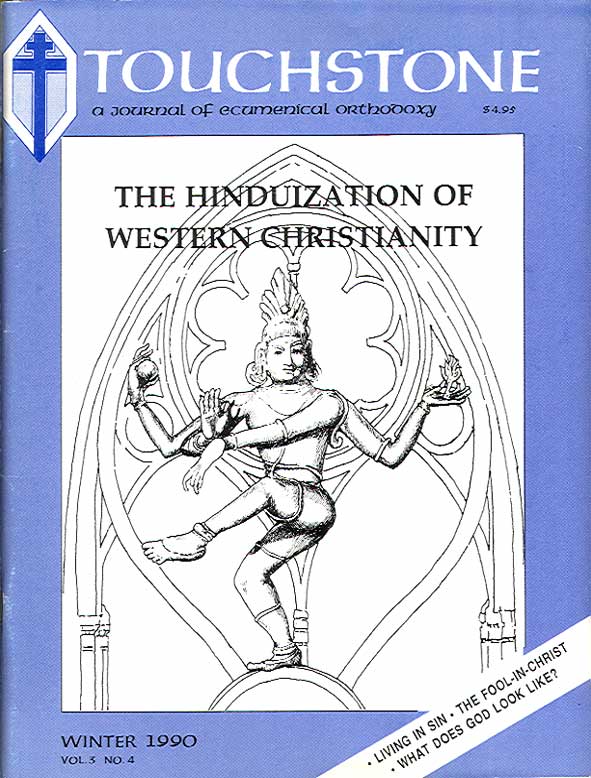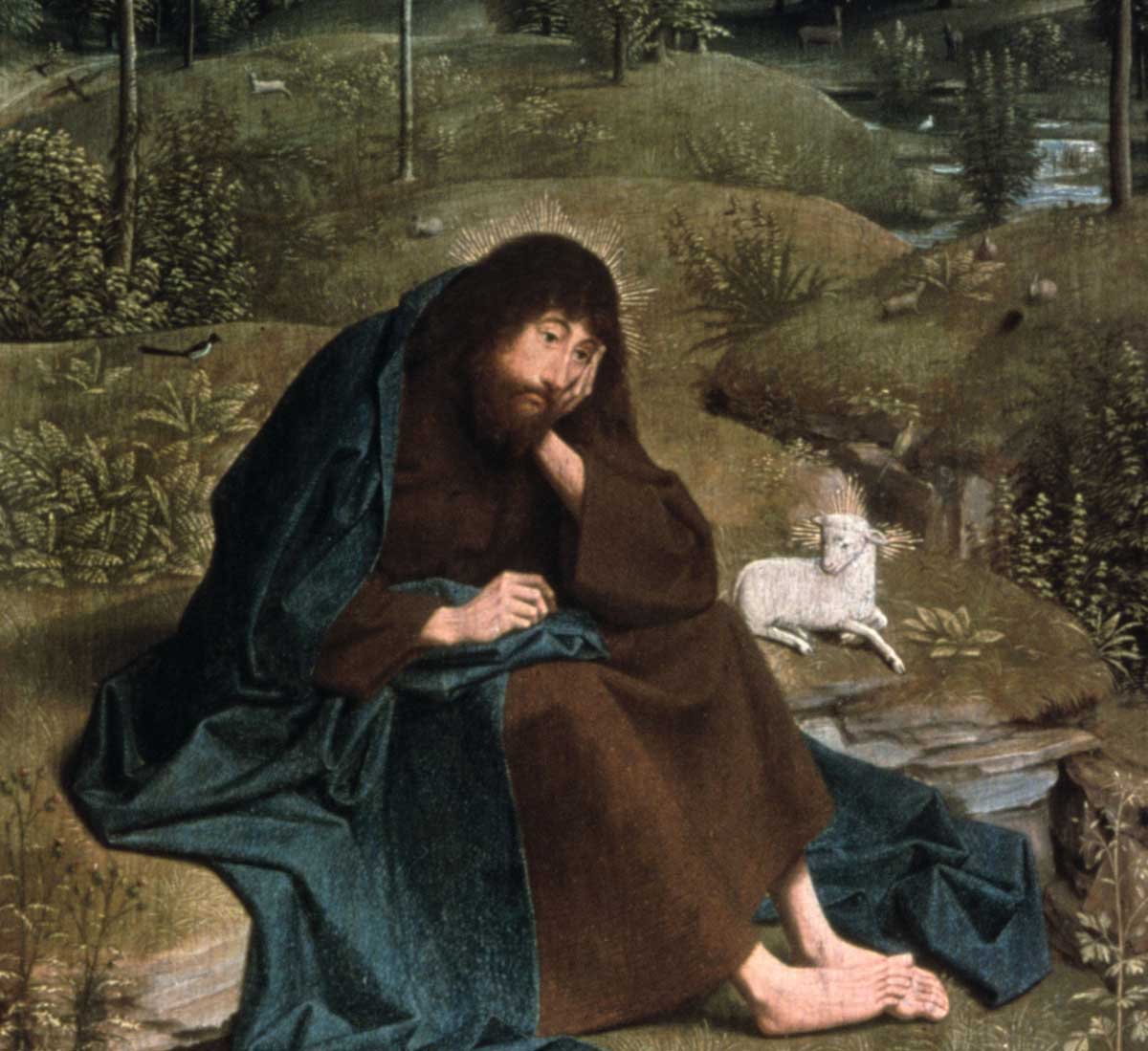Spirituality, Religion & Christian Faith
by S. M. Hutchens
After a mass presided over by a friend in the priesthood I was able to meet and briefly speak to the young man who had assisted him. Charlie impressed me as learned, well-spoken, and sincere. I was inclined to agree that he was a likely candidate for holy orders. This, indeed, is what he aspired to, and was gaining exposure to the inner life of the Church under my friend’s guidance. In a year or so, however, I learned that Charlie no longer professed exclusive allegiance to the Christian faith. What had attracted him to the Mass in the first place, he said, was something that he now recognized as common to all religions, which was available in many places and was not the sole province of Christianity. Somewhere along the line Charlie had developed the conviction that what he had really been interested in all along was not Christianity itself but the “spirituality” which the ancient liturgies conveyed to him through Catholicism’s symbolic and liturgical life. This he now understood to be the common element of every religion—or, more precisely, every spirituality, whether professedly religious or not. He could henceforth find what he sought anywhere he sensed its presence—in the Catholic Mass, the enthusiasm of Evangelicalism and the Charismatic movement, in Quaker and Buddhist quietism, in Mozart and mantra, each in its own way and measure.
Spirituality seems a popular commodity these days. The term is coming increasingly into common use as a shorthand designation for the most meaningful and significant quality of the life of the human spirit. The concept no doubt reflects to some degree our age’s impatience with overt expressions of dogma and a corresponding preference for the “soft” or affective aspects of religious life and thought as over against the “hard” intellective and doctrinal part. The idea of spirituality, moreover, conveniently serves to represent the religious attitude found in every faith, whatever differences may exist between official credos. The Paulist Press Classics of Western Spirituality series, a “library of the great spiritual masters” with a stellar editorial board, includes among its representatives of spirituality writings as diverse as those of William Law, Emmanuel Swedenborg, and the Zohar of the Spanish-Jewish Kabbalah. Fuller Theological Seminary, founded in 1947 as the academic flagship of American neo-Evangelicalism, advertises to prospective students that it will train them in “both scholarship and spirituality.” There is still some reason to doubt that Fuller has consciously abandoned its distinctively Evangelical piety or is now attempting to train its students in generic spirituality of the sort the Paulist Press editors have in mind. One might be justifiably curious, however, whether this use of “spirituality,” combined with Fuller’s well-chronicled openness to various trends of doctrine and practice, serves to illustrate a heightened susceptibility in relatively rootless and heterogenous Christian groups to a concept of spirituality, rather than doctrine or tradition, as a unifying force.
But whence the appeal to Roman Catholics and others from the older and more integrated churches? Perhaps they too are attracted by the beauty and power of the concept of spirituality which I am attempting to define in this article, a concept which presents itself as able to do nothing less than bind estranged humanity together under a single religious idea, to perform a task at which the Christian Church, with its dogged insistence on conversion over convergence, has hitherto failed.
I don’t think Charlie would disagree with me if I identified this “spirituality” as the common name given at present to the outworking of humanity’s primal religious instinct, the phenomenon most frequently identified simply as “religion” in the post-Enlightenment West. Where Charlie and I would disagree is on the neutrality or even, as he apparently feels, the benignity of the realm in which this spirituality functions and to which it professes to point. In order to become “spiritual,” Charlie has very deliberately stepped outside of Christianity and forced himself to un-learn much of what it tried to teach him. In particular he has chosen to forget that the spiritual world is less like a park where sheep may safely graze on anything that meets their fancy than a battleground which contains real enemies and upon which men hazard their eternal souls.
To be sure, there is something like a “religious” mind which is common to all humanity, which may even perhaps be provisionally described by Schleiermacher’s very distinctive notion of Gefühl 1 (a concept which accords well with that of spirituality). But we must emphatically part company with Schleiermacher and liberal theology in general when they identify this consciousness as being in relation with God if this is not the God revealed to the Church through the Lord Jesus Christ and his apostles. No one reaching the level of reflection demonstrated in the Glaubenslehre 2 can pretend that he has not come to his opinions through a process of intense critical interaction with traditional Christian doctrine. Schleiermacher’s world-view, despite its appearance of phenomenological purity (as if it were the result of purely objective reflection on the way things are) is the product of a very deliberate refinement of Christianity which goes beyond the historical faith and has become its judge. The continuing significance of this “Herrnhuter 3 of a higher order” in Protestantism is that he stands as a perduring symbol of what is now called “spirituality” and the unsurpassable prophet of the universalized religion which follows it.
A similar if not identical bent of mind may be found among the fathers of American religious liberalism. The Unitarian divine Theodore Parker, in an address delivered in Boston in 1841, identifies the transient element of Christianity as “forms and doctrines,” the permanent part with “the divine life of the soul, love to God, and love to man.”
The doctrines that have been connected with Christianity, and taught in its name, are quite as changeable as the form. . . . Now there can be but one Religion which is absolutely true, existing in the facts of human nature, and the ideas of the infinite God . . . though the manifestations of this religion, in forms, doctrines, and life, be ever so diverse. [The Transient and Permanent in Christianity (Beacon, 1961), 119–120]
As delicately as he wishes to say it, Parker’s Jesus, remarkable and inspiring a religious genius as he may be, is dispensable to essential Christianity as Parker sees it. Making him “the Son of God in a peculiar and exclusive sense” is a “heathen” notion.
So if it could be proved—as it cannot—in opposition to the greatest amount of historical evidence ever collected on any similar point, that the gospels were the fabrication of designing and artful men, that Jesus of Nazareth had never lived, still Christianity would stand firm, and fear no evil. None of the doctrines of that religion would fall to the ground; for if true, they stand by themselves. [Ibid., 133]
For Parker the essence of Christian religion is not Jesus himself, but the message Jesus came to bring, epitomized as “absolute, pure Morality; absolute, pure Religion; the love of man; the love of God acting without let or hindrance.” [Ibid., 140]
. . . religious doctrines and forms will always differ, always be transient. . . . But the Christianity holy men feel in the heart—the Christ that is born within us, is always the same to each soul that feels it. This differs only in degree and not in kind, from age to age and man to man. . . . It makes us outgrow any form, or any system of doctrines we have devised, and approach still closer to the truth.” [Ibid., 143; emphasis Parker’s]
The generalized spirituality of Schleiermacher4 and Parker is a creature of a deliberative will, carefully picking its way through the field of Christian revelation in which it is profoundly uncomfortable. It frequently poses as the objective product of a primal religious urge, but is in fact always connected with intelligent reflection, and belief in it depends upon informed decision. Although its evaluation of data rests upon a predisposition to see things in its own peculiar way, an attachment to this kind of spirituality, as we also have seen in Charlie’s case, is not primordial but responsive. What is invariably rejected in the process of reflection (invariably resulting in a gross reconstruction of the biblical Christ) is the person of Jesus as the first and final revelation of God, the “Son of God in a peculiar and exclusive sense,” the archetypical Man, the second Person of the Holy Trinity. In short, this generalized spirituality repudiates Jesus Christ as he has been revealed to the Christian Church.
It follows that the notion of a putatively universal spirituality must be viewed in accordance with the important differences between those who have heard the gospel and those who have not. Only the evangelized are in a position to understand Jesus Christ as the unique and supreme revelation of God and discipline their spiritualities in accordance with acceptance or rejection of what they have heard. One form of rejection is that which we have seen in Theodore Parker, the invariable and conclusive mark of religious liberalism—an arbitrarily “Christian” spirituality built on pious relativization of the finality of Christ. In contrast, some aspects of the spiritual life of pagans—let the reader note the cautious wording here—may be veritable anticipations of the gospel. The story of the Magi comes quickly to mind. Ignorance of God which arises from mere lack of knowledge (Acts 17:30) and that which issues from direct rebellion (Rom. 1:21), while both, ultimately speaking, devolve from human sin, appear to be distinguishable in accordance with whether they are the relatively innocent ignorance of the pagan or the willful and confirmed ignorance of the once-enlightened (Heb. 6:2–8). The most forceful and convincing proponents of universal spirituality are invariably among the latter. They appear to be better than they are when they are able to equate their own spirituality—that of the heretic or apostate—with that of the ignorant or half-taught, for theirs is an infinitely more culpable error. And increasingly the heretic, the apostate, and those they have deluded are bringing into contemporary Christianity an anti-Christian form of religion under the guise of “spirituality.”
In the Christian view of reality man is an inhabitant of a radically partisan universe of spirits. The Christian’s understanding of the life of his own spirit must consequently take into serious consideration the Church’s beliefs about the character of the spiritual world and his place in it. His concept of “spirituality” must have reference to the being and acts of particular spirits—of God, of men, and of angels, fallen and unfallen. I will admit the naked idea of spirituality could be unobjectionably employed to denote the quality of being common to all spirits. But the term is, as a matter of fact, used that way rarely if ever. In common parlance it is ambiguously but suggestively clothed with the notion that spirituality is not simply the peculiar quality of spirits, but the universal essence of religion, in and of itself a desideratum and a positive moral good—an emphatically un-Christian idea. When this happens the spirituality of every spiritual being is subtly but effectively endued with an illegitimate uniformity: darkness is brought into light, mixing and confusing the spirituality of the spirits. Evil spirits are exalted by making mere spirituality in itself good, the holiness of God is obscured by insinuating that his spirituality is common with that of the demons, and ignorant men are made prey to the desire to gain this kind of (defiled) spiritual life.
The attack of Christian dogmatic science on generalized spirituality arises from its belief in the absoluteness of the revelation of God in Jesus Christ. Orthodoxy perceives that in these non-Christian “spiritual” belief systems our Lord is merely a fungible symbol of higher reality to which a different name may be given—in which he is certainly not the unique and irreplaceable manifestation of the one true God. The appalling spectacle of lapsed bishops worshipping at heathen altars is a natural outgrowth of this displacement: If Christ is merely a supreme representative of the Spiritual Ideal, the Ideal may be worshipped under whatever name it appears. Our reasonable hope that God has true children in all times and places, when adapted to the principles of generalized spirituality, is transformed into the manifest fallacy that all religious people worship the same God under different names. In Christian theology the only “higher” reality for which Christ stands is that of God the Father who is never known apart from his consubstantial Son, who is revealed to us by the Holy Spirit. Christians must realize that much of what calls itself spirituality has the effect—ultimately founded on satanic intention—of dethroning Jesus Christ as the supreme revelation of God in and by whom all other revelations are judged. This is done by making him into merely a significant part of a greater truth. And this is, of course, precisely what Charlie did. In enlarging his “church” in the name of spirituality, he enlarged his Christ, and thus made a different and greater Christ than that of the historic Christian faith.
In numerous places in the New Testament (e.g., the Parables of the Net and the Tares, and in I Cor. 10:1–12), it becomes apparent that those who live within the symbolic system of orthodoxy are perhaps in the greatest jeopardy of succumbing to the error of which we speak. The most subtle and dangerous of all delusions is the mistaken belief that a home within the received images, signs, texts, traditions, and even the sacraments of the Church, apart from their substance (which is the living God himself) is in fact something greater than a fondness for the form of a distinctively “Christian” spirituality. Mere spirituality can be efficiently maintained in an orthodoxy without faith: one can be born, baptized, nurtured, confirmed, ordained, and consecrated in the true Church without being born from above. Mortimer Adler (an attractively candid man) refers to an analogous phenomenon in his autobiography:
In view of my admiration for Aquinas and his philosophy, it was natural and proper for [Clare Boothe Luce, who had converted to Roman Catholicism] to ask me why I had not become a convert also. I replied by telling her of the distinction that Aquinas makes between dead and living faith. Dead faith consists in faith without charity. . . . What is lacking to make the believable actually believed as a living creed is charity—the love of God and the will to live in accordance with that love. My state of mind, I told Clare, bore some resemblance to what Aquinas described as a dead, rather than living, faith. [Philosopher at Large (Macmillan, 1977), 315].
Adler realized full well that being a Thomist, as Christian as St. Thomas’s system may be, did not make him a Christian, and presumably that baptism would do him no good unless it were accompanied by the caritas which he did not have. The difference between Dr. Adler and many others “taken in the net” as it were—which perhaps would have allowed us to hope better things for him than he was willing to hope for himself—is he knew that more than mere intellectual conformity to—indeed, more than a certain kind of passion for—the faith is required. One may in like manner exercise even an intense “spirituality” and be deceived into thinking that he is a Christian simply because it is done in and under the life of the Church.
Although what has been said immediately above refers primarily to the perils of spirituality in the Catholic traditions and confessional Protestantism, the dangers of inauthentic spirituality may be no less for those sectarian Protestants who tend to judge the truth by the satisfaction it produces in their religious life. Their temptation may be distinguished from that of those with deeper traditions and dogmatic moorings by noting their susceptibility to the blandishments of a spirituality which makes its appeal principally to feeling. The heart strangely warmed has a powerful tendency to become the heart warmed strangely, giving rise to a defective criterion of truth which eventually shows itself willing and able to judge the Church on the basis of an alien religious aesthetic.
American evangelicalism has in the last century and a half been particularly vulnerable to compromise by this means. In its losing struggle to retain its cultural dominance (and then, failing this, to salvage its respectability) it has become culpably open to the secular culture which has created for it the essentially aesthetic standard by which it judges its own spiritual life. Taking advantage of evangelicalism’s desire for acceptance, its culture has demanded and received expanding openness to distinctively non-Christian life and thought, and the churches are caught in an increasingly ludicrous attempt to make themselves attractive by advertising to the spiritual appetites of carnal men. Liberal churches are acculturated evangelical churches grown tired of their hypocrisy. These are well served by every inclusive ideal, that of spirituality included, and lack the will to maintain even a moribund orthodoxy.
The most delicate question raised by the issue of spirituality, to which we must finally return, is whether all humanity has a unitary religious identity and hence a single spirituality—Charlie’s basic contention. If this were all he meant to assert, it appears to me that the Christian Scriptures agree with him. But they would profoundly disagree with his belief that because of this human spirituality in itself may be regarded as a virtually unqualified good—as if its congress with evil was not a pervasive feature of human spiritual life. For the fallen creature, the refusal to regard fallenness (and all this implies about the present life and destiny of man) as an essential problem of human spirituality is a denial of it. Those who deny the sickness have already spurned the Remedy.
As we have observed above, while the advocates of generalized spirituality in the evangelized world have a strong tendency to compare their condition to that of the pagan, there is an important difference between those who have turned away from Christ and those among the pagans who have not as yet received revelation sufficient to recognize him but who nevertheless share, in effect, the spirituality of the evangelized believer. Yes, to be sure, there is a common human spiritual world and life, a common spirituality, if you will. But within that dwell the child of light, both before and after he knows the Name of Christ, and the child of darkness. Both are spiritual beings (as God and Satan are), but not by virtue of that strictly “alike.” Nor are their spiritualities comparable past a certain point. This is why Charlie, asserting the contrary, has crossed a critical divide. Attempting to mingle light and darkness in affirmation of the spiritual ambiguity of his own being he invites the enmity of the God who is Light and in whom there is no darkness at all.
Notes:
1. Normally translated “feeling,” but not to be understood as though it had reference to a merely affective relation between God and man. For Schleiermacher, the “feeling of absolute dependence” is an expression for the intuition that self-consciousness is comprised of awareness of both a self and a corresponding Absolute Other. This is not an empty instinct, but pregnant with the Christian Faith as he understands it.
2. Schleiermacher’s major theological treatise: ET, The Christian Faith, trans. H. R. Mackintosh and J. S. Stewart (Edinburgh: T. & T. Clark, 1928).
3. Schleiermacher’s notorious reference to himself as a pietist who really understood what pietism was all about. Herrnhut was the religious community founded on the estate of Count Zinzendorf in 1722. It became a major center for the Moravian Brethren, from whom Schleiermacher received much of his early training.
4. In Barth’s lectures on Schleiermacher, (whose name means “veil maker”), he quotes a little verse by A. W. Schlegel:
Der nackten Wahreit Schleier machen,
Ist kluger Theologen Amt,
Und Schleiermacher sind bei so bewandten Sachen
Die Meister der Dogmatik ingesamt.
(“To veil the naked truth is the clever theologian’s office; all masters of dogmatics are Schleier-machers in the nature of the case.”)
S. M. Hutchens is a senior editor and longtime writer for Touchstone.
subscription options
Order
Print/Online Subscription

Get six issues (one year) of Touchstone PLUS full online access including pdf downloads for only $39.95. That's only $3.34 per month!
Order
Online Only
Subscription

Get a one-year full-access subscription to the Touchstone online archives for only $19.95. That's only $1.66 per month!
bulk subscriptions
Order Touchstone subscriptions in bulk and save $10 per sub! Each subscription includes 6 issues of Touchstone plus full online access to touchstonemag.com—including archives, videos, and pdf downloads of recent issues for only $29.95 each! Great for churches or study groups.
Transactions will be processed on a secure server.
more from the online archives
calling all readers
Please Donate
"There are magazines worth reading but few worth saving . . . Touchstone is just such a magazine."
—Alice von Hildebrand
"Here we do not concede one square millimeter of territory to falsehood, folly, contemporary sentimentality, or fashion. We speak the truth, and let God be our judge. . . . Touchstone is the one committedly Christian conservative journal."
—Anthony Esolen, Touchstone senior editor









